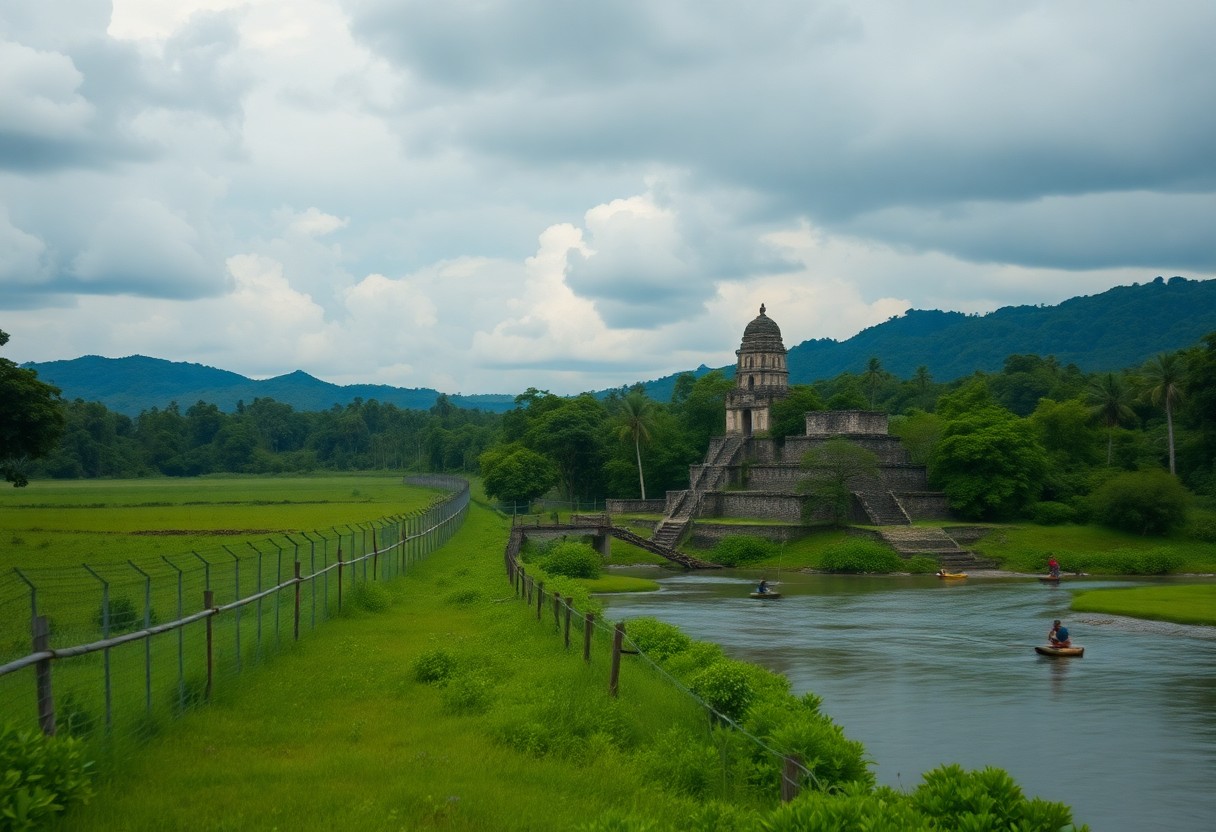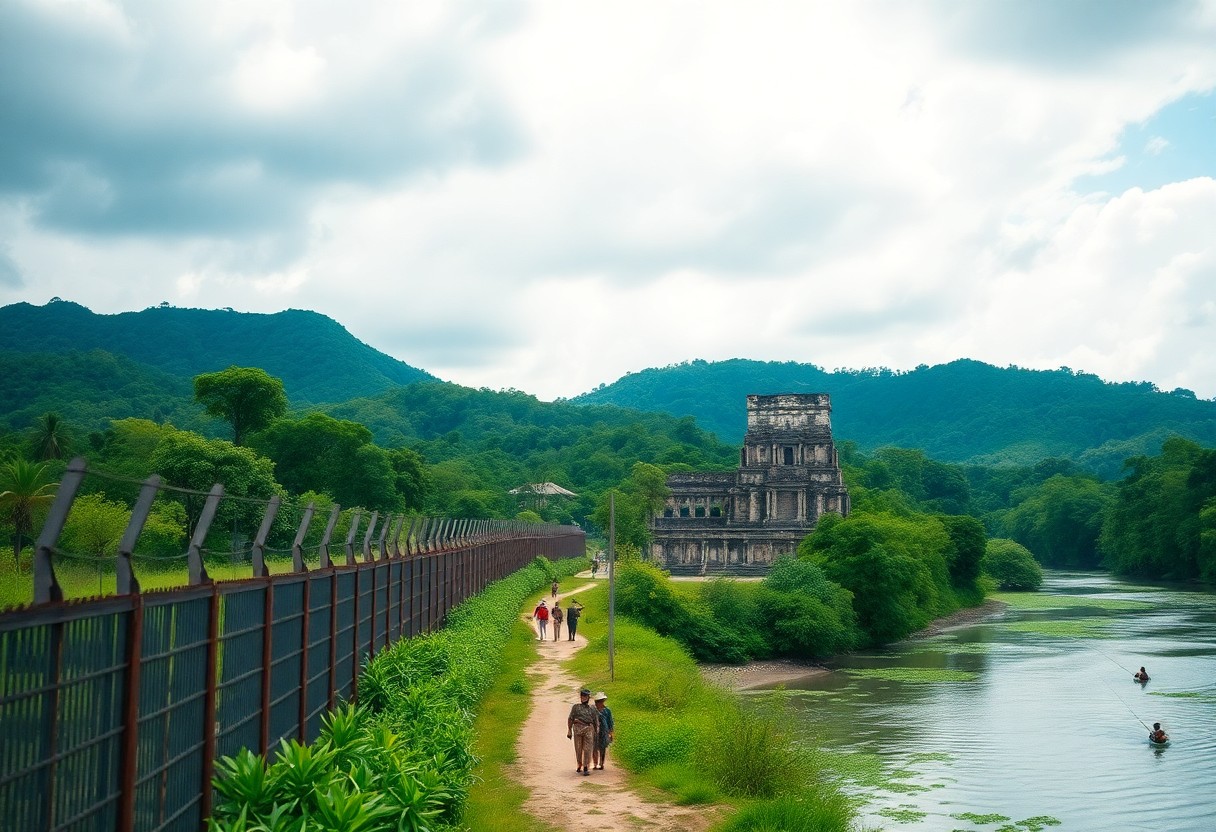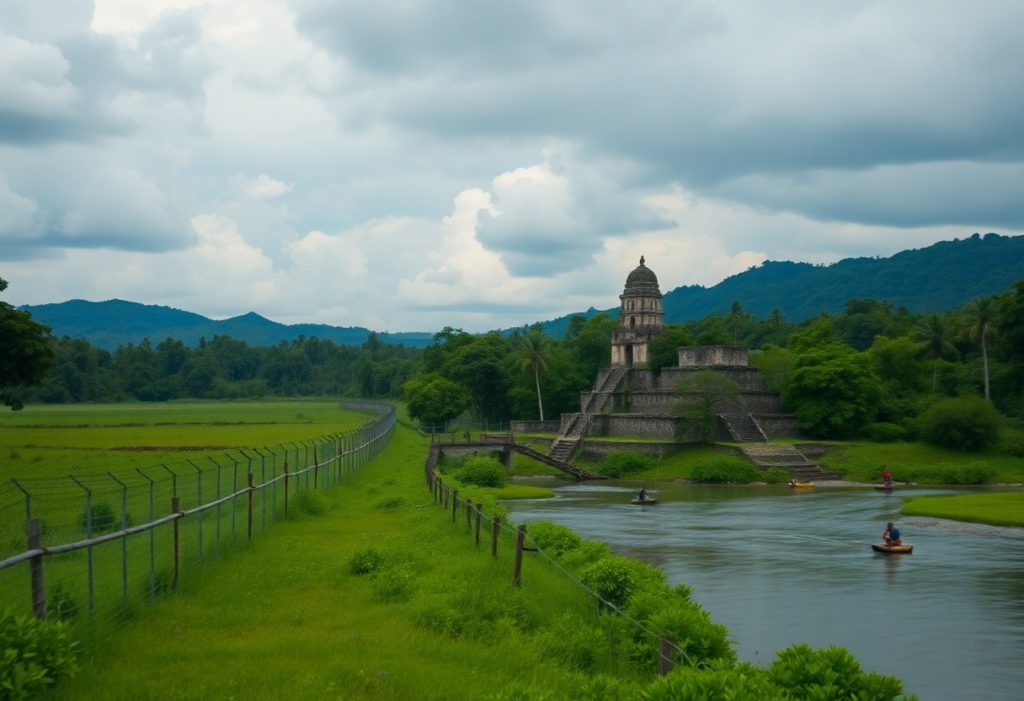The intricate and multifaceted territorial dispute between Belize and Guatemala presents a complex geopolitical tension that has endured for centuries, surprising many with its depth and historical roots. This ongoing border conflict, deeply embedded in colonial-era claims, has historically threatened regional stability, as Guatemala has persistently contested Belize’s sovereignty since Belize achieved independence. Despite decades of diplomatic friction and ongoing tensions, recent developments have sparked a sense of optimism for peaceful resolution. Notably, both countries participated in a landmark referendum in 2019, where citizens voted to pursue resolution through the International Court of Justice. This initiative marks a significant potential turning point in their contentious relationship. Gaining a comprehensive understanding of this border's intricate history is crucial for grasping the broader geopolitical dynamics of Central America.

Unpacking the Colonial Roots of the Belize-Guatemala Border Dispute
The intricate complexity of the territorial disagreement between Belize and Guatemala can be traced back to colonial-era territorial claims, which were driven by the ambitions of Spanish and British empires. The roots of this dispute lie in the competing interests of European powers in Central America, with both nations asserting claims over strategically valuable territories. The unresolved boundary conflicts have evolved into a persistent source of tension, exemplifying the complicated historical dynamics surrounding territorial sovereignty in the region. The legacy of these colonial claims continues to influence the political landscape, illustrating how historical grievances have lasting impacts on modern diplomatic relations.
Examining the Impact of the 1859 Boundary Treaty on Modern Territorial Claims
Set against the backdrop of imperial negotiations, the 1859 Boundary Treaty between Britain and Guatemala sought to delineate territorial borders. However, this agreement, intended to resolve conflicts, inadvertently compounded complications rather than settling them. The treaty’s ambiguous language and various interpretations have become a core source of ongoing territorial disputes between the two nations. The complexities surrounding this treaty highlight the enduring consequences of colonial agreements on present-day conflicts, as both Belize and Guatemala grapple with the implications of these historical treaties.
Exploring the Historical Context of Territorial Negotiations
From the era of Spanish colonial rule to the establishment of modern nation-states, the landscape of territorial negotiations has been intricate and dynamic. The geopolitical dynamics of the region were significantly influenced by imperial rivalries and the shifting boundaries of colonial territories, setting the stage for future conflicts. These boundary disputes reflect a deeper narrative involving colonial legacies and postcolonial territorial challenges. The strategic importance of the territory has historically fueled conflicts, with Guatemala consistently contesting Belize’s sovereignty. This multifaceted dispute encompasses issues of historical interpretation, indigenous rights, and territorial integrity, rendering it a complex international controversy that continues to shape diplomatic relations between the two countries.
Analyzing the Core Issues Driving the Belize-Guatemala Border Dispute
The intricate border dispute between Belize and Guatemala encompasses a myriad of historical, territorial, and political dimensions. Primary tensions arise from competing claims over land, sovereignty, and differing interpretations of history. The conflict, deeply rooted in colonial boundaries, has been perpetuated by international legal disputes and enduring nationalist sentiments, presenting significant challenges in the diplomatic landscape for both nations. Gaining insight into these core issues is essential for addressing the complexities of the dispute and working towards a resolution that honors the interests of both countries.
Unpacking Guatemala’s Assertion of Territorial Claims
Guatemala primarily claims approximately 12,000 square kilometers of Belizean territory, asserting historical rights rooted in Spanish colonial boundaries. Their claim challenges the legitimacy of British territorial acquisitions, focusing on interpretations of historical treaties and colonial agreements that Guatemala argues were unjustly imposed. This assertion underscores Guatemala's ongoing struggle to reclaim what it views as ancestral land, emphasizing the deep-seated grievances that fuel the dispute and highlighting the necessity for a nuanced approach to resolution.
Understanding Belize's Defense of Its Sovereignty
The discussions surrounding Belizean sovereignty are vital, emphasizing the nation’s right to self-determination and the protection of its territorial integrity. Belize firmly asserts its independence and categorically rejects Guatemala’s territorial claims, underscoring the significance of international recognition and the legal principle of uti possidetis juris, which supports maintaining existing colonial boundaries post-independence. Further exploration reveals that Belize’s sovereignty is reinforced by international law and numerous United Nations resolutions. The country has consistently advocated for its territorial integrity, leveraging diplomatic avenues and garnering international support to safeguard its borders. Moreover, peaceful resolution mechanisms, including international mediation, have become critical strategies in addressing this protracted dispute.

Investigating Diplomatic Efforts for Conflict Resolution
The efforts to resolve the enduring border conflict between Belize and Guatemala have involved a range of international mechanisms and negotiations. Both nations acknowledge the potential risks associated with ongoing territorial tensions, prompting them to pursue peaceful solutions through diplomatic channels. International mediation and bilateral discussions have been instrumental in gradually reducing historical animosities and creating pathways toward resolution. Understanding these diplomatic efforts can illuminate the progress made and the challenges that remain in achieving a lasting peace.
Gaining Insights into the Diplomatic Negotiations
The diplomatic negotiations between Belize and Guatemala have been marked by gradual progress and strategic dialogue aimed at fostering mutual understanding between the two nations. These discussions have focused on exploring potential compromise solutions that could address the interests of both parties. Key diplomatic initiatives have included high-level meetings, bilateral commissions, and international facilitation, all aimed at addressing territorial claims and promoting regional stability. This ongoing dialogue highlights the critical role of diplomacy in resolving complex geopolitical issues and encouraging cooperative relations.
Understanding the Role and Significance of the International Court of Justice
The International Court of Justice (ICJ) plays a pivotal role in mediating the border dispute between Belize and Guatemala. The ICJ serves as a neutral legal platform for addressing territorial claims, offering an internationally recognized mechanism for dispute resolution that has the potential to resolve decades of territorial tensions. The court’s involvement is not merely about arbitration; it signifies a critical turning point in Belize-Guatemala relations. By agreeing to submit their dispute to the ICJ, both countries have demonstrated a commitment to pursuing a peaceful resolution. The court's forthcoming ruling could definitively clarify territorial boundaries, potentially establishing a permanent legal framework for future bilateral relations and enhancing regional stability.

Understanding the Impact of the Dispute on Travel and Trade Dynamics
Navigating the complex Belize-Guatemala border necessitates a comprehensive understanding of its multifaceted challenges. The historical territorial disputes have had significant implications for cross-border interactions, shaping unique travel and economic dynamics. The ongoing tensions have influenced transportation routes, trade patterns, and diplomatic relations between these neighboring nations. The border region requires careful consideration of geopolitical sensitivities that could affect movement and economic exchanges, making it critical for travelers to remain informed and adequately prepared.
Current Travel Guidelines for Safety and Awareness Along the Border
Traveling along the Belize-Guatemala border necessitates exercising heightened caution. Your safety relies on staying informed about current diplomatic conditions and potential conflict zones. Official travel advisories recommend checking government websites prior to crossing, verifying documentation, and maintaining awareness of local security situations. Careful route planning, including using official border crossings, can minimize risks and enhance your travel experience in this sensitive region.
Analyzing the Dynamics of Cross-Border Trade
The trade relations between Belize and Guatemala at the border remain intricate and continually evolving. Despite historical tensions, agricultural products and small-scale commercial exchanges persist, reflecting the economic interdependence that continues to exist between these two nations. To fully understand these interactions, one must recognize the resilience of economic relationships that thrive despite political challenges. The trade landscape reveals a complex web of interactions where agricultural commodities such as sugar, citrus, and timber play significant roles in cross-border exchanges. Informal trade networks, facilitated by local merchants, navigate the diplomatic complexities, underscoring how economic cooperation can persist amidst territorial disputes. Ongoing bilateral agreements and diplomatic negotiations continue to shape these economic interactions, offering promising prospects for future collaboration and mutual benefits.
Examining the Socio-Political Implications of the Border Dispute
The border dispute between Belize and Guatemala extends far beyond mere geographical lines, embodying profound socio-political implications for both nations. This territorial conflict significantly affects diplomatic relations, national security strategies, and broader regional dynamics. The ongoing tensions create complex socio-political challenges that influence governmental strategies, international negotiations, and the daily lives of citizens in both countries. Understanding these implications is vital for comprehending the broader effects of the dispute on the region's stability and collaboration.
Exploring National Identity and Public Sentiment Surrounding the Dispute
The border dispute resonates deeply with national pride and historical narratives in both Belize and Guatemala. Each country perceives the territorial claims as a matter of fundamental sovereignty, leading to passionate public discourse and political sentiment. This conflict has evolved into a powerful symbol of national identity, as citizens fervently defend their historical perspectives and territorial integrity. The emotional weight of these claims shapes public opinion, influencing political discourse and national policy, thereby highlighting the intricate relationship between territorial disputes and national identity.
Assessing Regional Stability and Security Challenges Due to the Dispute
The ongoing border dispute poses potential vulnerabilities in regional peace and cooperation. Unresolved territorial claims generate diplomatic tensions that could destabilize bilateral relationships and impact broader regional security dynamics. Recognizing these challenges is crucial for understanding the complex geopolitical landscape of Central America. The dispute represents more than a simple territorial disagreement; it threatens regional stability by increasing the risk of military escalations. The persistent tensions complicate economic cooperation, cross-border trade, and collaborative security efforts. Awareness of these dynamics elucidates how unresolved territorial claims can undermine diplomatic progress and create long-term challenges for peaceful coexistence between Belize and Guatemala.
Envisioning Future Prospects for Diplomatic Resolution
Despite the complex historical tensions, the situation along the Belize-Guatemala border presents potential pathways for diplomatic resolution. Ongoing negotiations and international mediation hold the promise of achieving a peaceful settlement. The international community remains supportive of constructive dialogue between both nations, suggesting that a comprehensive resolution may be attainable in the coming years. The commitment to diplomacy signifies a crucial step toward addressing longstanding grievances and fostering a more stable future.
Identifying Potential Resolutions to the Territorial Dispute
Resolutions to the enduring territorial dispute might involve international arbitration or a mutually agreed-upon territorial compromise. Observing the recent willingness of both countries to engage in diplomatic discussions suggests that a mutually beneficial agreement may be on the horizon. The involvement of neutral international bodies could provide a structured framework for resolving historical claims, paving the way for more effective conflict resolution strategies that prioritize long-term peace.
The Role of International Relations in Shaping Border Negotiations
International relations significantly influence the border negotiations between Belize and Guatemala. Diplomatic channels have emerged as vital tools for managing territorial tensions and fostering constructive dialogue. Regional organizations and global diplomatic platforms continue to play essential roles in facilitating discussions and pursuing peaceful solutions. Additionally, the broader geopolitical context affects these border relations, as international pressure and diplomatic engagement create opportunities for resolution. The potential for economic cooperation, joint development projects, and shared security interests presents promising avenues for collaboration. Organizations such as the OAS have been instrumental in mediating discussions and promoting peaceful interactions between the two nations.
Frequently Asked Questions About the Belize-Guatemala Territorial Dispute
What historical events contributed to the territorial dispute between Belize and Guatemala?
The territorial dispute originated from Spanish colonial claims and British settlement in the region during the 19th century. Spain initially claimed the territory, but Britain established settlements in Belize, leading to intricate legal and territorial challenges. The conflict centers on competing territorial assertions, with Guatemala maintaining claims to a substantial portion of Belize’s land following Central American independence in 1821.
How has the international community contributed to resolving the border conflict?
The Organization of American States (OAS) has played a significant mediation role in the dispute. In 2008, both countries agreed to submit their conflict to the International Court of Justice (ICJ) for a binding resolution. A referendum held in both Belize and Guatemala during 2018-2019 demonstrated public support for international judicial intervention, ultimately paving the way for a peaceful resolution mechanism.
What is the current status of the Belize-Guatemala border agreement?
In May 2019, the ICJ issued a definitive ruling on the territorial dispute, largely affirming Belize’s sovereignty while making minor adjustments to the border demarcation. The ruling granted Belize approximately 12,272 square kilometers of territory, providing a clear legal framework for future diplomatic relations and establishing permanent maritime and land boundaries between the two nations.
The Article The Belize-Guatemala Border: History, Conflict, and Current Status appeared first on Belize Travel Guide
The Article Belize-Guatemala Border: Historical Conflicts and Current Status Was Found On https://limitsofstrategy.com


